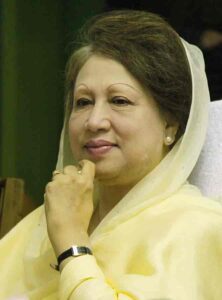
From Prison to Power: The Untold Journey of Khaleda Zia – A Biography of Resilience, Influence, and Uncovered Secrets! Bangladesh’s Controversial Leader.
Early Life and Family
Khaleda Zia was born in 1945 in Jalpaiguri, which is now part of India. Her parents, Iskandar Ali Majumder and Taiyaba Majumder, valued education and public service. They taught Khaleda the importance of civic responsibility. This upbringing influenced her interest in politics. In 1960, Khaleda married Ziaur Rahman, a key figure in Bangladeshi history. He later became the President of Bangladesh. Their marriage was both personal and strategic. Ziaur played a significant role in the Bangladesh Liberation War and became a leader in the post-independence era. Khaleda’s marriage gave her insight into governance and politics. Khaleda and Ziaur had two sons, Tarique Rahman and Arafat Rahman, known as “Koko.” Khaleda balanced her family duties with her growing political involvement. Her sons grew up in a politically active household, learning about leadership and public service. Tarique Rahman later became a prominent political figure.
Political Career
Khaleda Zia began her political career in 1984 by leading the Bangladesh Nationalist Party (BNP) after her husband, Ziaur Rahman, was assassinated. Ziaur had founded the party in 1978. This event marked the start of her role as a significant political figure in Bangladesh. Khaleda Zia served as Prime Minister of Bangladesh for three terms. Her first term was from March 1991 to February 1996. She led the country through a political transition after the fall of the Ershad regime. Her government worked on economic challenges and improving education. A severe cyclone in 1991 created many difficulties for her administration.
In February 1996, Khaleda briefly served as Prime Minister again, but this term ended quickly due to an election boycott. Later that year, Sheikh Hasina’s Awami League came to power. Khaleda remained active in politics and continued her rivalry with Sheikh Hasina. Khaleda’s third term as Prime Minister was from October 2001 to October 2006. She promised to tackle corruption and terrorism and pursued economic reforms. However, Transparency International ranked Bangladesh as the most corrupt country in the world from 2001 to 2005.
Khaleda’s political career featured a strong rivalry with Sheikh Hasina. They have been the only two leaders to serve as Prime Minister since 1991, highlighting the polarized nature of Bangladeshi politics. In 2018, authorities jailed Khaleda on corruption charges under an army-backed government. This government took power after she left office in 2006. They released her in 2020 on humanitarian grounds due to her health issues. She remained under house arrest until recently when she was freed after Sheikh Hasina resigned amid widespread protests.
Key Decisions and Controversies
During her time as Prime Minister, Khaleda Zia made important decisions that shaped Bangladesh’s political and economic landscape. One of her major actions was changing the presidential system to a parliamentary government. This shift changed the balance of power and how the government worked. Khaleda’s administration also lifted restrictions on foreign investment. This decision aimed to boost the economy and attract international capital. By creating a welcoming environment for foreign businesses, Khaleda hoped to spur economic growth. However, some people argue this led to increased inequality and exploitation of local resources.
In education, Khaleda introduced compulsory and free primary education. This policy significantly improved literacy rates. It ensured children from all backgrounds had access to basic education. Many praised this move as a step towards reducing inequality and improving the country’s human capital. Despite these achievements, Khaleda’s time in office was not without controversy. In 2004, a grenade attack occurred at a rally led by her rival, Sheikh Hasina. The attack resulted in numerous casualties and was widely condemned. Although Khaleda denied involvement, the incident cast a shadow over her legacy and worsened the rivalry between the two leaders.
Corruption Charges.
Khaleda and her family also faced several corruption charges. These allegations included embezzlement, money laundering, and abuse of power. Her political opponents used these charges to discredit her. While some charges were dismissed or unproven, they contributed to the perception of corruption and nepotism in her political circle. Khaleda Zia’s political career has had major controversies. The 2004 grenade attack on a rally led by her rival, Sheikh Hasina, stands out. On August 21, 2004, attackers threw thirteen grenades into the crowd, targeting Hasina. The attack killed 24 people and injured over 500. Ivy Rahman, a prominent Awami League leader and Hasina’s close associate, was among those who died. People condemned the attack both domestically and internationally, demanding thorough investigations and accountability.